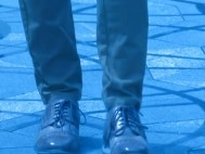Will

(Text only clips) Will developed acne at age 13. He tried creams and antibiotics before being referred to a dermatologist. He took a 6 month course of Roaccutane (isotretinoin) which had some physical and emotional side effects such as chapped lips and low mood.
Will is 21 and a university undergraduate student. He is single and lives in shared accommodation. His ethnic background is White British.
More about me...
Will developed acne at the age of 13. At this time, none of his school friends had spots and he felt that this made him stand out from his peers. He used some shop bought face washes but when these did not help, he visited his GP. He was given some antibiotic tablets to try as well as some benzoyl peroxide cream. He was referred at age 14 to a dermatologist where he was given a 6 month course of Roaccutane (isotretinoin). He experienced some physical and emotional side effects from Roaccutane such as very dry, chapped lips and low mood.
An important source of information and support for Will was his mum, who has a background in healthcare. She was able to help Will make decisions about his acne treatment by asking questions at doctor appointments and researching about Roaccutane in medical journals. Will feels that it is important to be aware of side effects which are less severe but more commonly experienced from taking Roaccutane. For example, he found that one emotional side effect from Roaccutane was difficulty enjoying activities he had previously taken part in, such as sports. He couldn’t recall talking to his dermatologist about the emotional side effects but he also thought that he would probably have been reluctant to do so at the time. He felt that his acne itself had been an inconvenience but not a source of major upset whereas the emotional side effects of Roaccutane were more distressing. However, he is ultimately glad that he took Roaccutane because the treatment worked well for him in clearing his skin and his mood improved after he had finished the course.
Will thinks that the emotional side effects of Roaccutance increased his feelings of angst and unhappiness during adolescence. He says that being a teenager is often already a difficult time and that acne can add to this. For example, having acne and the effects of Roaccutane meant that his confidence was knocked and he did not feel that relationships were for him. He focused during this time on consolidating his pre-existing friendship group rather than trying to make new friends. He found that listening to music helped a great deal and that “moody” post-rock bands could be good in the sense of sharing low feelings. Music became particularly important at the same time that he lost interest in his other main leisure activity of sport. This was partly because Will found that his energy levels were reduced whilst he was on Roaccutane and he also sometimes found it difficult to cope with the social side of playing sport which required him to always appear happy.
Will now sometimes draws on his experience of taking Roaccutane when talking to friends who are themselves affected by acne. He finds that people can sometimes be shy about bringing up the topic but that sharing his experience of having acne at a younger age can help open up conversations. He thinks that it’s important for other young people to reflect on their own situation and make decisions about treatment suited to them. For example, he encourages others to “think about the impact outside of just your skin”, including how treatments can affect social activities such as drinking alcohol socially.


